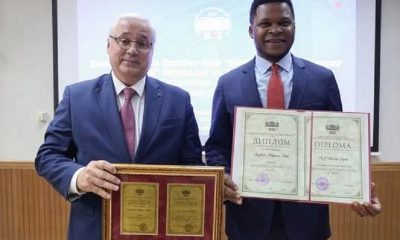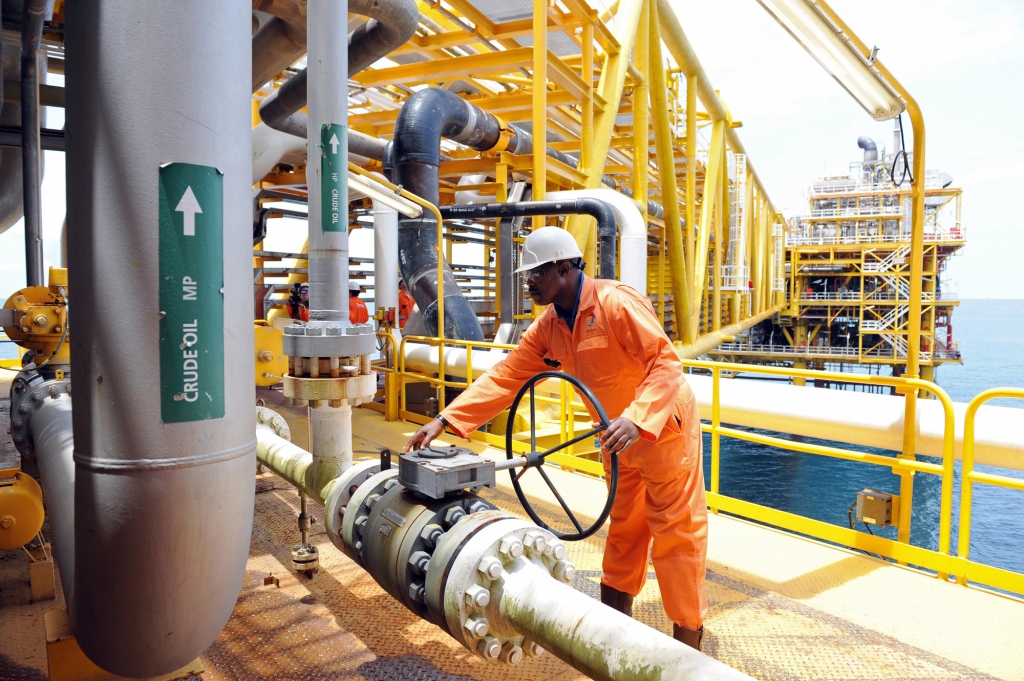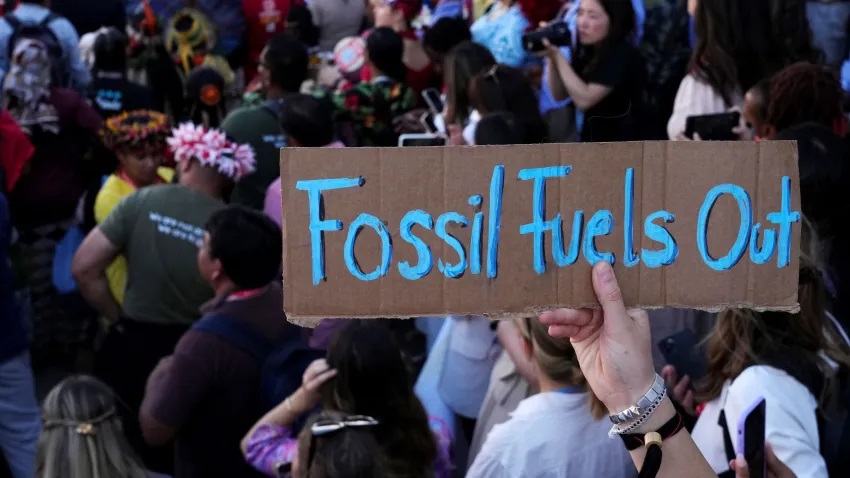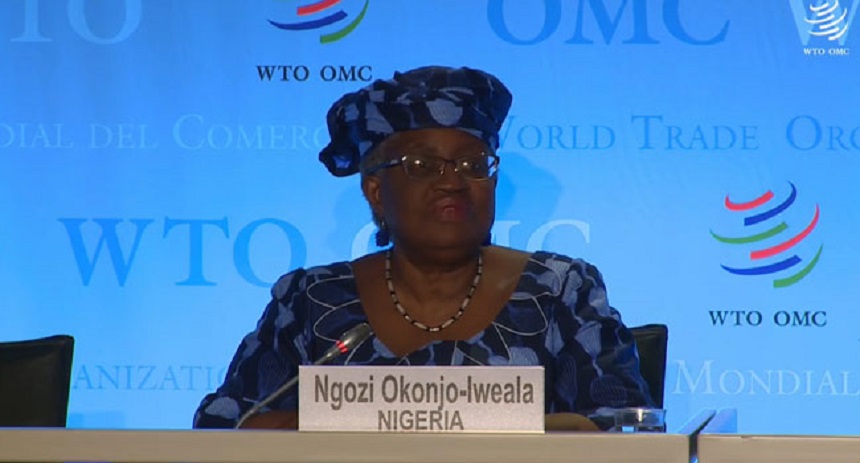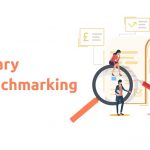General
Africa Needs Technological Expertise to Unlock Full Potential of Energy Resources—Ayuk
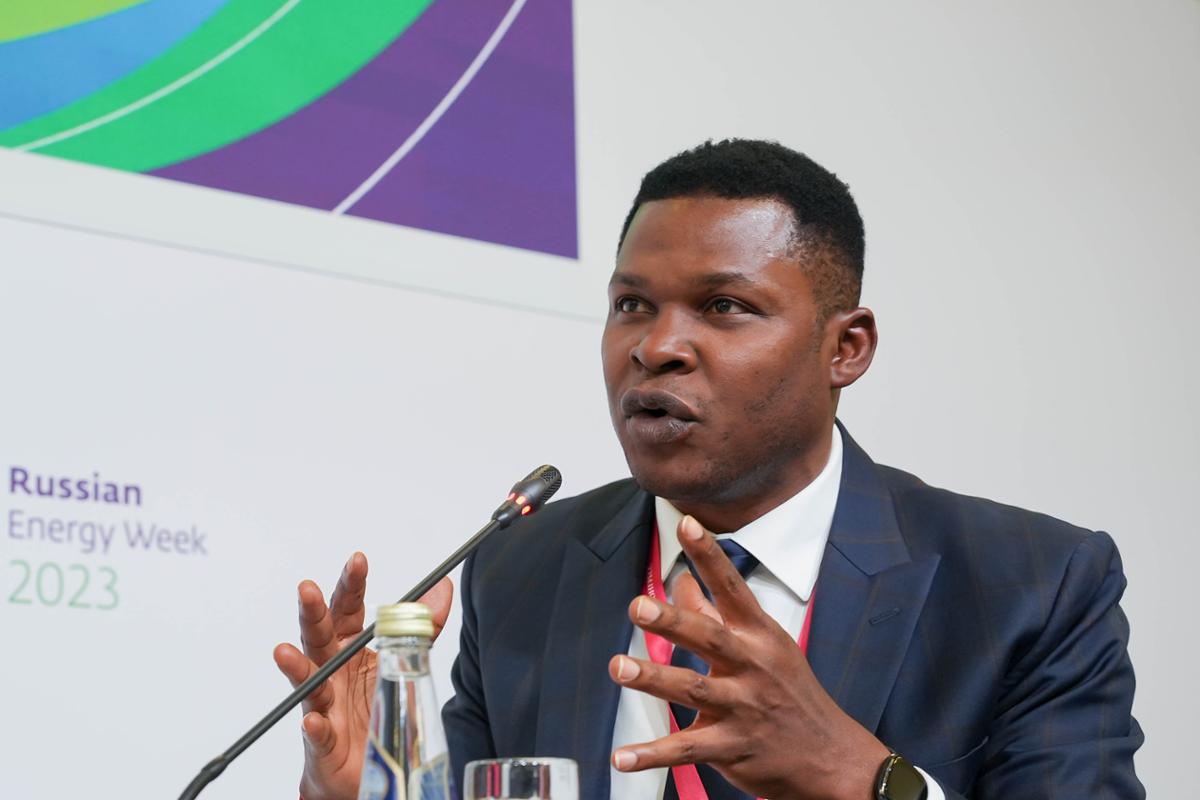
By Kestér Kenn Klomegâh
The Russian Energy Week International Forum is a key global platform for discussing current trends in the development of the modern energy sector. This event is traditionally held at the highest level, featuring the participation of leaders from the largest companies in the energy industry. In 2023, the forum attracted over 3,000 participants from more than 80 foreign countries.
On the sidelines of the forum, the Executive Chairman of the South Africa-based African Energy Chamber, Mr NJ Ayuk, acknowledged in an exclusive interview that Africa is developing as the fastest-growing energy market in the world. That, however, substantial investment and infrastructure development are required to realize this market potential.
In this interview, NJ Ayuk further explained the necessary steps African countries are adopting to ensure sustainable energy development, how the activities of Russian companies fit into this context, as well as existing challenges and financial support measures for projects in the energy sector across Africa. Here are the excerpts of the discussion:
After participating in the Russian Energy Week in mid-October, what are your objective views (especially during the special Russia-Africa energy sessions) about exploring business and investment in the energy sector with Russia?
There lies significant opportunities for both bilateral and multilateral cooperation between Russia and African countries. Russia represents the third largest oil producer worldwide and has effectively utilized its substantial gas reserves for the development of its economy. At the same time, the country is exploring renewable energy solutions and is looking at expanding its footprint in other markets worldwide.
With substantial expertise and resources in various energy domains, lessons learnt by Russia will be highly strategic for emerging oil and gas producers in Africa. And already, there is strong interest by both sides to foster strong ties and partnerships, evident during the Russian Energy Week this October. Russian companies such as Gazprom – which organized an event with the African Energy Chamber this year in South Africa – represent ‘global energy companies’, and as such are eager to play a greater role in investing and developing international markets. Gazprom has vast expertise is all segments of the value chain. The same can be said for Russia’s state-owned Rosatom. Africa represents both a strategic and highly attractive market in this regard. With over 125 billion barrels of proven oil reserves, 620 trillion cubic feet of natural gas and unparalleled solar, wind and hydro potential, the continent has all the ingredients to become a major global player.
What Africa needs to unlock the full potential of its energy resources is investment and technological expertise. Russia offers both. Now, what is left is for Africa to improve its business environment and prioritize engagement with its East European partner.
By the way, how do you estimate Russia’s engagement in the energy sector across Africa? What has been achieved over the past few years in Africa?
Russia’s engagement with Africa has been gradually growing over the years and we see this predominantly in the energy sector. For years, there have been strong trade and cooperative ties with countries such as South Africa, Morocco, Egypt, Algeria and many more, primarily in the food, machinery and chemical product industries. However, energy cooperation has presented newfound opportunities for both Russia and the African continent. Changes in global supply-demand dynamics, coupled with energy transition impacts, have led to a new focus placed on the strategic Russia-Africa partnership.
In recent years, Russian companies have advanced their engagement with Africa, with several agreements signed across various segments of the value chain. While historical ties have been largely trade-based, these agreements showcase a commitment by the country to expand its technological expertise worldwide. In the nuclear industry, for example, Russia’s Rosatom has signed a wave of agreements with burgeoning nuclear power producers in Africa. These include memoranda of understanding signed with South Africa in 2014 and 2023; Rwanda in 2019; Burkina Faso in October 2023; Burundi in July 2023; and Mali in October 2023. Additional agreements were signed with Zimbabwe and Uganda. And while oil and gas engagement has been minimal to date, going forward, a shift in priorities is expected to see Russia-African cooperation rapidly expand.
Do you think Russia lags in supporting Africa with energy compared to other external players such as China? Can ‘energy mix’ help to drive Africa’s industrialization and economic growth?
It is not about comparing support but rather about exploring future engagement and partnerships. Russia has been a strong partner for Africa for many years and will be an important part of Africa’s energy future. Russia is looking at playing a much larger role in Africa, going further than operating as a project developer. The country’s efforts to share insights, expertise and technology will represent a key driver of Africa’s future energy mix, which in itself is an important feature for alleviating energy poverty and industrializing the continent. Africa is promoting a diverse, inclusive energy mix, one in which oil, gas and renewable energy play a central role. Russia has been highly successful in this area, with natural gas and nuclear making up a significant portion of its energy matrix. In the same sense, African countries have all the resources needed to implement a diverse energy mix, and Russian support will be strategic in achieving this objective.
Is Russia participating in the formation of the proposed African Energy Bank? And finally what potentials are there to develop this sphere of energy business, especially with the heightening dynamics of the global situation?
The African Energy Bank is an initiative spearheaded by the African Petroleum Producers Organization and the African Export-Import Bank that aims to significantly improve access to financing for African oil and gas projects. The bank is an Africa-led energy transition strategy that takes into account Africa’s need for oil and gas. Support from major players such as Russia will be critical, strengthening the bank’s capacity to finance a new future of hydrocarbon development in Africa. The changing global energy situation calls for the establishment of an institution of this nature. Africa has long relied on foreign finance to develop large-scale energy projects. From oil to natural gas to power and infrastructure, the continent is faced with navigating the complexities of global market trends. The establishment of the bank aims to counter this reliance, offering an alternative for project developers, countries and companies seeking finance.
General
Salary Benchmarking To Ensure Competitive Compensation
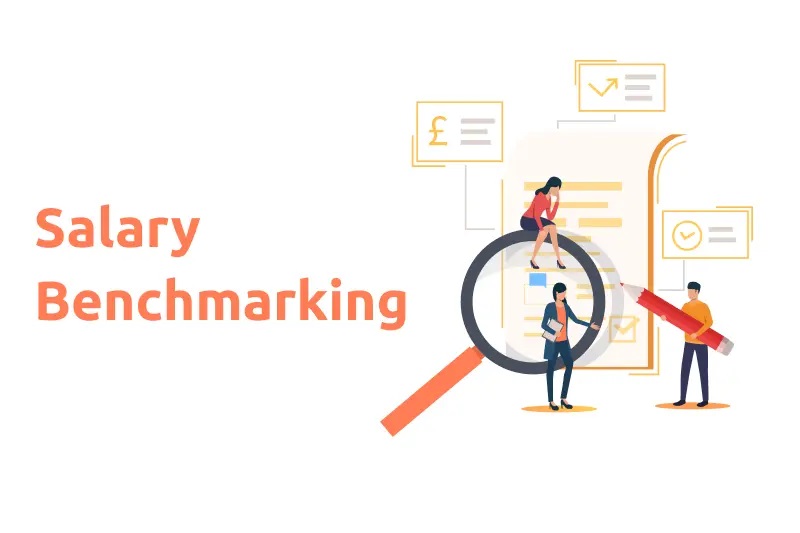
Salary benchmarking is the systematic process of comparing an organization’s pay rates, bonus programs, and total rewards against market standards. This article walks through why benchmarking matters, how to prepare and run an analysis, the best data sources and tools, and how to turn findings into defensible pay structures and ongoing processes.
Why Salary Benchmarking Matters For Online Businesses And Agencies
Without benchmarking, organizations risk three costly outcomes: underpaying (leading to high turnover and loss of institutional knowledge), overpaying (inflating fixed costs and reducing agility), or misallocating compensation across roles (creating internal inequities and morale problems).
For agencies that pitch retainer-driven services, predictable labor costs tied to market rates enable healthier margins and clearer pricing decisions. For in-house ecommerce teams, benchmarking supports workforce planning when launching new product lines or scaling paid acquisition efforts.
Finally, benchmarking is not only financial: it signals professionalism to candidates.
Key Data Sources And Tools For Accurate Benchmarks
High-quality benchmarking blends public data, commercial platforms, and human intelligence.
Public Government And Aggregated Salary Data
Bureau of Labor Statistics (BLS) or national equivalents provide reliable occupational wage ranges, useful for baseline comparisons and compliance checks.
Industry Surveys, Salary Platforms, And Niche Reports
Platforms such as Payscale, Glassdoor, LinkedIn Salary, and specialized reports for marketing and tech roles give role- and location-specific distributions.
Recruiter Intelligence And Peer Networks
Recruiters and hiring agencies provide real-time insight into candidate expectations and accepted offers. Professional networks, Slack communities, and agency owner peer groups can also offer current market anecdotes that databases miss.
Internal Payroll Data And Turnover Metrics
Historical payroll, hiring velocity, offer-acceptance rates, and exit interview themes help normalize market data against internal realities. Using multiple inputs helps find a defensible midpoint.
How To Conduct A Benchmark Analysis Step By Step
A repeatable process keeps benchmarking actionable and defensible.
- Gather data from at least three sources: one government/aggregate, one commercial salary platform, and one recruiter/peer input.
- Normalize data for location and experience. Convert salaries to equivalent cost-of-living or remote-adjusted values if the company has distributed teams.
- Adjust for total compensation. Include expected bonus, commissions, equity, and benefits to compare total rewards, not just base pay.
- Build a comparison table with target percentiles (25th, 50th, 75th) for each role and highlight gaps vs. current pay.
- Prioritize changes. Use a matrix that weighs business impact, retention risk, and budget feasibility to recommend immediate, near-term, and deferred adjustments.
This framework produces a clear narrative: where pay is behind, how much closing the gap will cost, and which adjustments will most protect revenue and client delivery.
Translating Benchmark Results Into Pay Structures And Budgets
Benchmark results must become predictable pay structures.
Normalize Data For Location, Experience, And Role Level
Apply consistent location multipliers and level definitions (junior, mid, senior, lead) so internal fairness stands up to scrutiny.
Build Pay Bands, Ranges, And Target Percentiles
Create bands with minimums, midpoints, and maximums tied to the chosen target percentiles. Bands help managers make consistent offer decisions and reduce bias.
Model Total Cost Of Hire And Budget Impact
Factor in employer taxes, benefits, onboarding costs, and ramp time. Present scenarios that show both absolute costs and return-on-investment when a higher-paid senior reduces client churn or improves campaign ROI.
Design Salary Bands, Bonus Structures, And Noncash Benefits
Consider sales- or performance-linked bonuses for account managers and revenue-attributed roles. Align Compensation To Performance, Retention, And Career Paths
Tie movements within bands to objective competency milestones (e.g., “strategic link acquisition that improves DR by X points” or “reduced time-to-rank for client cohort”), creating transparent merit progression that drives retention.
Communicating, Implementing, And Ensuring Pay Equity
Change management is as important as the numbers.
Gain Leadership Buy-In And Set Change Management Steps
Present benchmarking findings with clear ROI scenarios and phased implementation options. Leadership will respond to cost/benefit clarity, show how targeted raises stabilize revenue-generating roles.
Communicate Changes To Employees And Handle Pushback
Be transparent about methodology and timelines. Provide managers with scripts explaining why adjustments are happening and how employees can progress to higher bands.
Document Compliance, Pay Equity, And Recordkeeping Practices
Maintain audit-ready records of data sources, decision rationales, and salary matrices. Regularly run pay-equity checks by gender, race, and tenure to avoid legal and moral risks.
Thoughtful communication reduces rumors and ensures raises are seen as strategic investments, not arbitrary rewards.
Ongoing Monitoring: KPIs, Review Cadence, And Market Adjustments
Benchmarking isn’t a one-off. It requires monitoring and simple KPIs.
Track Competitive Positioning, Turnover, And Time To Fill
KPIs should include average comp vs. market percentile, voluntary turnover by role, offer-acceptance rate, and time-to-fill for critical positions. These metrics signal when the market has shifted.
Schedule Regular Reviews And Trigger-Based Market Rechecks
A typical cadence is an annual formal benchmark with quarterly spot checks for priority roles. Trigger-based rechecks, when turnover spikes, when offer-acceptance drops below a threshold, or when the market is disrupted, keep pay competitive between formal cycles.
With a small set of KPIs and a clear review cadence, agencies and online businesses can avoid reactive panic hires and keep compensation aligned with strategy and market reality.
Conclusion
Salary benchmarking equips online businesses and agencies to hire and retain the right talent without sacrificing profitability. When done well, benchmarking clarifies where to invest, makes offers defensible, and reduces turnover among roles that materially affect client outcomes and rankings.
General
BPP Confirms N1.1trn Savings from Procurement Reforms in 2025

By Adedapo Adesanya
The Bureau of Public Procurement(BPP) said the ongoing procurement reforms saved the federal government over N1.1 trillion between January and December 2025.
The Director-General of the bureau, Mr Adebowale Adedokun, revealed this while defending the agency’s 2026 budget before the Senate Committee on Public Procurement in Abuja on Thursday.
The bureau also reported reduced contract approval timelines, additional cost savings, and tougher sanctions imposed on erring contractors and non-compliant government officials.
Mr Adedokun appealed for increased budgetary allocation in 2026 to enhance service delivery, create jobs, and strengthen institutional capacity for procurement oversight.
He further revealed that the bureau received N4.032 billion in 2025 and sought higher funding to reinforce anti-corruption efforts under the administration of President Bola Tinubu.
Earlier, the Chairman of the Senate Committee, Mr Olajide Ipinsagba, a lawmaker from Ondo North, underscored the bureau’s strategic role in driving socioeconomic development and promoting fiscal discipline.
Mr Ipinsagba assured the agency of legislative support while urging strict accountability and prudent utilisation of public funds allocated for its operations.
BPP reforms were committed to deepening transparency, compliance, and efficiency in Nigeria’s public procurement system. Some of them include adherence to a 21-day timeline, as mandated by the Public Procurement Act 2007. Also, the BPP is required to review cases, issue a written decision within 21 working days of receiving the complaints, and state the corrective actions, reasons for rejection, or remedies granted.
There are also plans to streamline approval processes, standardise documentation, and automate workflows to ensure timely and transparent procurement decisions.
General
FCT Council Elections: Police Impose 12-Hour Curfew
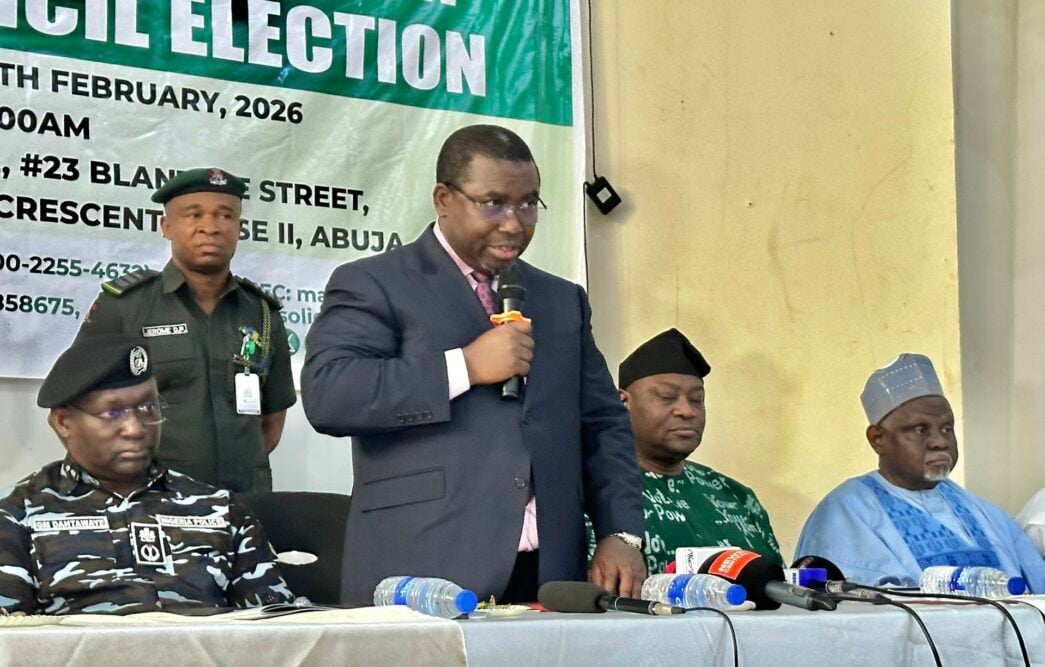
By Adedapo Adesanya
The Federal Capital Territory (FCT) Command of the Nigeria Police Force (NPF) has announced a 12-hour restriction on movement across Abuja and its environs ahead of the council elections scheduled for Saturday, February 21, 2026.
In a statement, the Police Public Relations Officer of the FCT Command, Mrs Josephine Adeh, said the movement will be restricted to ensure security and the smooth conduct of the polls.
“The Commissioner of Police, FCT Command, Miller G. Dantawaye, psc., has announced a restriction of movement across the Federal Capital Territory from 6:00 AM to 6:00 PM on Saturday, 21st February, 2026, in view of the scheduled Area Council Elections,” the statement read.
The police clarified that the restriction will apply to all residents, except essential service providers and duly accredited election officials.
The command also called on residents to remain peaceful and cooperate with security agencies.
“The FCT Police Command urges residents to remain peaceful, law-abiding, and cooperate with security agencies to ensure a safe, free, and credible electoral process,” the statement added.
Meanwhile, the FCT Minister, Mr Nyesom Wike, declared Friday a work-free day ahead of the council elections.
In a broadcast, Mr Wike said the decision, approved by President Bola Tinubu, is to enable residents to travel to their communities to vote.
In contrast to the police announcement, the minister declared a separate restriction of movement across the FCT from 8:00 p.m. on Friday to 6:00 p.m. on Saturday, directing security agencies to ensure compliance.
Mr Wike urged residents to turn out in large numbers and conduct themselves peacefully, expressing optimism that the polls would produce leaders who would promote development and stability in the territory.
In the meantime, the Independent National Electoral Commission (INEC) says preparations for the elections are at an advanced stage, with strong voter participation recorded during the PVC collection exercise.
INEC disclosed that 1,587,025 Permanent Voter Cards (PVCs) have been collected across the FCT, representing a 94.4 per cent collection rate out of the 1,680,315 registered voters.
Security agencies have assured residents of adequate deployment across the territory to maintain order, as authorities emphasise the need for a peaceful, free, and credible electoral process.
-

 Feature/OPED6 years ago
Feature/OPED6 years agoDavos was Different this year
-
Travel/Tourism10 years ago
Lagos Seals Western Lodge Hotel In Ikorodu
-

 Showbiz3 years ago
Showbiz3 years agoEstranged Lover Releases Videos of Empress Njamah Bathing
-

 Banking8 years ago
Banking8 years agoSort Codes of GTBank Branches in Nigeria
-

 Economy3 years ago
Economy3 years agoSubsidy Removal: CNG at N130 Per Litre Cheaper Than Petrol—IPMAN
-

 Banking3 years ago
Banking3 years agoSort Codes of UBA Branches in Nigeria
-

 Banking3 years ago
Banking3 years agoFirst Bank Announces Planned Downtime
-

 Sports3 years ago
Sports3 years agoHighest Paid Nigerian Footballer – How Much Do Nigerian Footballers Earn


